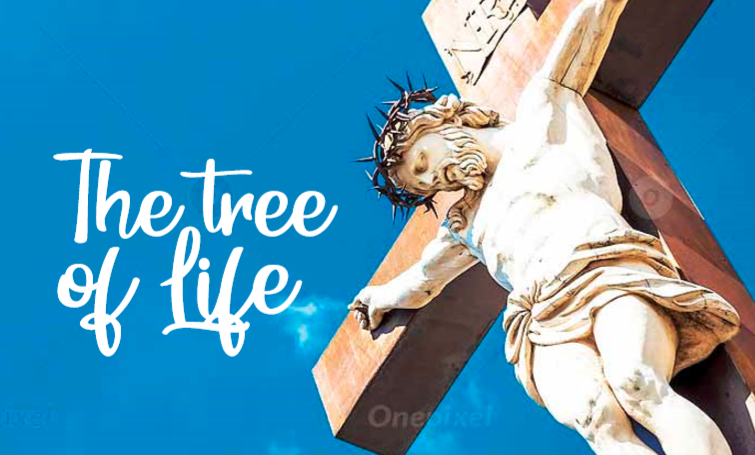The book of Genesis mentions two trees in the Garden of Eden, the tree of life and the tree of knowledge of good and evil. Adam and Eve were given the freedom to eat from all, except the second tree. Genesis 3:22-23 says that after the fall, man was banished from the garden so that he would not
eat from the tree of life in his unholiness. But God promised a Saviour who, through His death and resurrection, would crush the head of Satan and save mankind from his venom.
Born Again
When we listen or read the Word of God, we are approaching eternal life. “To all who received him, who believed in his name, he gave power to become children of God” (John 1:12). Further, through the Sacrament of Baptism, we are born again. That promise is seen in Revelation 2:7 – “To him who conquers I will grant to eat of the tree of life, which is in the paradise of God.” Psalms 1:3 refers to the righteous man, that is a holy person; “He is like a tree planted by streams of water, that yields its fruit in its season, and its leaf does not wither. In all that he does, he prospers”. Thus, if I want to be a holy person then I should place myself near a stream of living water, so that I may produce the fruits of the Holy spirit and remainevergreen, unaffected by the seasons of the world. Jesus said to the people around Him, “If any one thirsts, let him come to me and drink.” He who believes in me, as the scripture says, `Out of his heart shall flow rivers of living water’ (John 7:37-38). The next verse explains, “Now this he said about the Spirit, which those who believed in Him were to receive.” The Book of Revelations 22:2 says that the tree of life produces the fruits of the Holy Spirit.
Through Sacraments
Through the Sacraments of Baptism and Confirmation we receive the Holy Spirit. Mathew 12:33 says that the tree is known by its fruit. Ezekiel 28:7 says, you were blameless in your ways from the day you were created, till iniquity was found in you. As per 1 Peter 3:21, Baptism is an appeal to God for a clear conscience, through the resurrection of Jesus Christ. So, a holy person has the fruits of the Holy Spirit because he received the Holy Spirit through the Sacraments. The two distinct modes of transmission from the Church are the Holy Scriptures and Holy Tradition. Jesus said (John 6:63): “the words that I have spoken to you are spirit and life”, which means that the scripture is different from all philosophy quotes. It is living and active (Hebrew 4:12), that He is a person (John 1:1) and the soul of that person is the Holy Spirit. John 1:4 continues… “In him was life, and the life was the light of men.”
Transplanted in Fertile Soil
Some people may be upset, or worried or may think that they are not useful, unwanted, ugly, and unworthy. Sometimes these people may be cut down by these feelings or thoughts. Job 14:7-9 says, “For there is hope for a tree, if it be cut down, that it will sprout again, and that its shoots will not cease. Though its roots grow old in the earth, and its stump die in the ground, yet at the scent of water it will bud and put forth branches like a young plant.” Ezekiel 17: 1-10 tells us that these trees have to be transplanted in fertile soil; in other words, they need the Word of God. Thus, reading the Bible regularly helps us to thrive like a tree in fertile land. Romans 9:6 says, it is not as though the Word of God had failed, so it will not fail those lives.
None Should Perish
Some people might be prideful, thinking, “I am chosen, and others are not,” However, St Paul says in Romans 11:17-18, if some of the branches were broken off, and you, a wild olive shoot, were grafted in their place to share the richness of the olive tree, do not boast over the branches. If you do boast, remember it is not you that support the root, but the root that supports you. This also hints that we are the children of God through Jesus Christ. In Mathew 18:14, Jesus says,“It is not the will of my Father who is in heaven that one of these little ones should perish.”
Jesus the Vine
Ezekiel 15:1 says that wood of vine is useless other than to put into fire: “How does the wood of the vine surpass any wood, the vine branch which is among the trees of the forest?” In John 15, however, the meaning is different. Here, we are useful if Jesus is the vine and we are the branches. For this reason, Jesus insist that we should always remain in Him; “If you abide in me, and my words abide in you, ask whatever you will, and it shall be done for you. By this my Father is glorified, that you bear much fruit, and so prove to be my disciples” (John 15:7-8). How can I know that how close I am to the altar of Jesus? Mathew 12:33 says, “Either make the tree good, and its fruit good; or make the tree bad, and its fruit bad; for the tree is known by its fruit.” Let us examine ourselves through the fruits of the Holy Spirit. The tree which produces good fruits will not be cut down but may be pruned so as to yield more fruit. Also Psalm 104:16 says that those who are planted by the Heavenly Father and united to Jesus Christ, will be looked after by our Lord.
John the Baptist says, “Even now the axe is laid to the root of the trees; every tree therefore that does not bear good fruit is cut down and thrown into the fire” (Mathew 3:10). The aim of all trees planted by God the Father is to produce the fruits of the Holy Spirit. Jesus is the intercessor and mediator for all trees as in Luke 13: 8-9, “Let it alone, sir, this year also, till I dig about it and put on manure. And if it bears fruit next year, well and good; but if not, you can cut it down.” Ezekiel 47:12 affirms that the trees growing along the banks of the river originate from the temple of God: “On the banks, on both sides of the river, there will grow all kinds of trees for food. Their leaves will not wither nor their fruit fail, but they will bear fresh fruit every month, because the water for them flows from the sanctuary. Their fruit will be for food, and their leaves for healing.” So, let us be close to the Altar of Jesus through the Sacraments and the Word of God.
- by Sebastian Sales from Salford, UK




